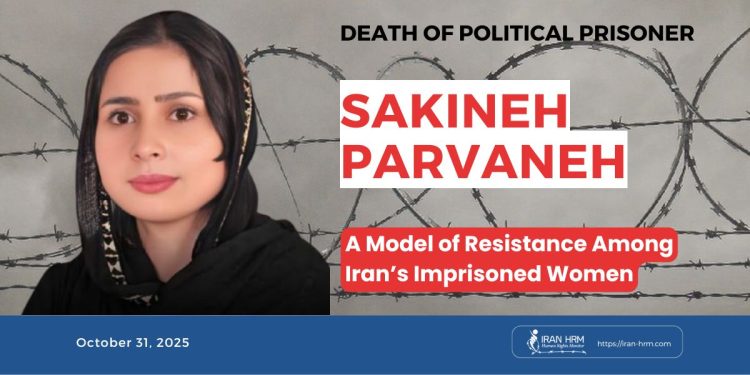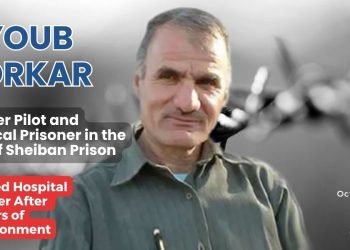Sakineh Parvaneh, born in 1988 in Quchan, is one of the imprisoned women activists whose life represents the layers of repression faced by female political prisoners in Iran. She has been arrested multiple times and sentenced to a total of over seven years in prison. Her most recent arrest took place in March 2024 by agents of the Islamic Revolutionary Guard Corps (IRGC), leading to her transfer to Vakilabad Prison in Mashhad. In April 2024, she was transferred to Evin Prison in Tehran, where she remains detained in the women’s ward. In September 2023, she was tried without access to a lawyer before Branch 1 of the Mashhad Revolutionary Court, presided over by Judge Mansouri. She was charged with “insulting Khamenei,” “propaganda against the regime,” and “collaboration with foreign media.” In October, she was sentenced to seven and a half years in prison — a verdict later upheld by the Court of Appeal.
Chronology of Arrests and Violations
Parvaneh was first arrested in autumn 2019 while visiting her family in Sulaymaniyah, Iraqi Kurdistan. After being handed over to Iranian security forces, she was detained in Mariwan and Sanandaj, then transferred to Evin Prison in Tehran, where she was interrogated and tortured in solitary confinement. In April 2020, after writing protest slogans on prison walls, she was transferred to Qarchak Prison and held in solitary confinement with handcuffs and shackles. She was then sent to Aminabad Psychiatric Hospital — a tactic often used by the regime to intimidate and humiliate prisoners. After returning to Qarchak, she began a hunger strike protesting a five-year sentence and a two-year ban on political activity. Later that year, she was beaten and sent back to Evin Prison, where she received an additional two-year sentence on charges of “rioting in prison.” In November 2020, she was exiled to Quchan Prison, where she sewed her lips shut and went on hunger strike in protest of her possible transfer to Isfahan Prison. She was transferred to Mashhad Central Prison in December 2020 and remained under pressure by the IRGC to make forced confessions. After serving four years, she was briefly released in February 2023, but was rearrested in March 2024 and transferred again to Vakilabad Prison. In April 2024, she was moved to Evin Prison in Tehran, where she is still being held.
Denial of Family Contact and Psychological Torture
Since September 2024, Sakineh Parvaneh has been completely denied phone calls and contact with her family — a punitive measure ordered directly by a court. Her elderly parents live in Mashhad and are unable to visit her in Tehran, leaving her entirely isolated. This act constitutes a clear violation of Articles 10 and 17 of the International Covenant on Civil and Political Rights (ICCPR) and Rule 58 of the UN Nelson Mandela Rules, which require humane treatment and the right of prisoners to maintain communication with their families.
Peaceful Protest and Hunger Strike
In May 2024, Parvaneh launched a hunger strike to protest the mistreatment of political prisoners and to show solidarity with families who lost loved ones during the 2022 nationwide protests. Instead of addressing her grievances, prison authorities retaliated by intensifying restrictions against her. Punishing her for a non-violent protest directly violates Articles 19 and 21 of the ICCPR, which guarantee freedom of expression and peaceful assembly.
A Letter from Prison: “No to Execution”
In March 2025, Sakineh Parvaneh released a powerful open letter condemning the death sentences issued against fellow political prisoners, including Mehdi Hassani, Pakhshan Azizi, and Behrouz Ehsani. She wrote: “When someone is under a death sentence, we do not ask what they have done. Instead, we unite our voices to say no to execution.” In the letter, she recounted her years of sharing cells with women awaiting execution — prisoners such as Monireh Nourikia and Mahbubeh Roshandel, both of whom were hanged.
Legal Analysis
Sakineh Parvaneh’s case illustrates systematic violations of international human rights standards: Articles 7 & 10 of the ICCPR prohibit torture and inhumane treatment. Article 14 ensures the right to a fair trial and legal counsel, both denied to her. Rules 43 & 58 of the Mandela Rules forbid disciplinary isolation and total deprivation of contact. Article 19 of the UDHR guarantees freedom of expression, breached by the criminalization of her speech and correspondence with media.
Conclusion and Call to Action
Sakineh Parvaneh remains one of the models of resistance among Iran’s imprisoned women who continue to defy the regime’s repression with courage and conscience. International human rights organizations should urgently demand that the ruling regime in Iran restore her right to contact her family, ensure access to an independent lawyer, and cease punitive measures against female political prisoners. The ongoing imprisonment and mistreatment of Sakineh Parvaneh is not an isolated injustice — it reflects a systematic policy aimed at silencing dissenting women. Yet even from behind bars, she continues to speak for life and justice: “No to execution, no to silence.”







